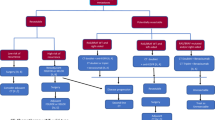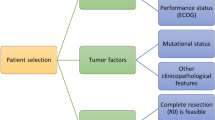Abstract
Background
The importance of preoperative chemotherapy in a multimodality management of patients with colorectal liver metastases (CRLM) has been demonstrated. We analyse the carcinoembryonic antigen (CEA) changes following neoadjuvant chemotherapy in patients with CRLM who underwent liver resection.
Methods
The final cohort included 107 eligible patients. Increased CEA levels following neoadjuvant chemotherapy were defined as the increase of baseline CEA level at diagnosis of CRLM compared with the CEA level after completion of neoadjuvant chemotherapy. Disease-free survival (DFS), post-recurrence survival (PRS) and overall survival (OS) were calculated using both Kaplan-Meier and multivariate Cox-regression methods.
Results
CEA increase was associated with decreased PRS and OS (HR 2.69; 95 % CI, 1.28–5.63; p = 0.009, and HR 2.50; 95 % CI, 1.12–5.56; p = 0.025, respectively) in multivariate analysis, but there was no association between CEA changes and DFS. CEA increase was only associated with disease progression during preoperative chemotherapy (p = 0.014). Interestingly, this association was not absolute, as only 5 of the 11 patients with disease progression demonstrated CEA increase. Regarding the remaining 12 patients with CEA increase, according to RECIST criteria, eight patients demonstrated partial response and four patients stable disease.
Conclusion
In this study, we demonstrated the CEA increase following neoadjuvant chemotherapy as an adverse prognostic factor for PRS, and OS but not for DFS in patients undergoing liver resection for liver-only colorectal metastases.



Similar content being viewed by others
References
Pawlik TM, Schulick RD, Choti MA (2008) Expanding criteria for respectability of colorectal liver metastases. Oncologist 13(1):51–64
Tomlinson JS, Jarnagin WR, DeMatteo RP, Fong Y (2007) Actual 10-year survival after resection of colorectal liver metastases defines cure. J Clin Oncol 25(29):4575–4580
Bismuh H, Adam R, Levi F et al (1996) Resection of nonresectable liver metastases from colorectal cancer after neoadjuvant chemotherapy. Ann Surg 224(4):509–520
Kemeny N (2007) Presurgical chemotherapy in patients being considered for liver resection. Oncologist 12:825–839
Nordlinger B, Van Cutsem E, Rougier P et al (2007) Does chemotherapy prior to liver resection increase the potential for cure in patients with metastatic colorectal cancer? A report from the European colorectal metastases treatment group. Eur J Cancer 43:2037–2045
Adam R, Delvart V, Pascal G et al (2004) Rescue surgery for unresectable colorectal liver metastases downstaged by chemotherapy: a model to predict long-term survival. Ann Surg 240:644–657, discussion 57–8
Neal CP, Garcea G, Doucas H, Manson MM et al (2006) Molecular prognostic markers in resectable colorectal liver metastases: a systematic review. Eur J Cancer 42:1728–1743
Tanaka K, Shimada H, Fujii Y, Endo I et al (2004) Pre-hepatectomy prognostic staging to determine treatment strategy for colorectal cancer metastases to the liver. Arch Surg 389:371–379
Fong JG, Fortner R, Sun MF, Brennan MF et al (1999) Clinical score for predicting recurrence after hepatic resection for metastatic colorectal cancer: analysis of 1001 consecutive cases. Ann Surg 230:309–321
Neofytou K, Smyth EC, Giakoustidis A, Khan AZ et al (2014) Elevated platelet to lymphocyte ratio predicts poor prognosis after hepatectomy for liver-only colorectal metastases, and it is superior to neutrophil to lymphocyte ratio as an adverse prognostic factor. Med Oncol 31(10):239–248
Lau LF, Williams DS, Lee ST, Scott AM et al (2014) Metabolic response to preoperative chemotherapy predicts prognosis for patients undergoing surgical resection of colorectal cancer metastatic to the liver. Ann Surg Oncol 21(7):2420–2428
Therasse P, Arbuck SG, Eisenhauer EA, Wanders J et al (2000) New guidelines to evaluate the response to treatment in solid tumors. European organization for research and treatment of cancer, National cancer institute of the United States. National cancer institute of Canada. J Natl Cancer Inst 92(3):205–216
Gold P, Freedman SO (1965) Demonstration of tumor-specific antigens in human colonic carcinomata by immunological tolerance and absorption techniques. J Exp Med 121:439–462
Gold P, Shuster J, Freedman SO (1978) Carcinoembryonic antigen (CEA) in clinical medicine: historical perspectives, pitfalls and projections. Cancer 42(3 Suppl):1399–1405
Thomson DM, Krupey J, Freedman SO, Gold PB (1969) The radioimmunoassay of circulating carcinoembryonic antigen of the human digestive system. Proc Natl Acad Sci U S A 64(1):161–167
Hara M, Sato M, Takahashi H, Takayama S et al (2013) Carcinoembryonic antigen elevation in post-hepatectomy patients with colorectal cancer liver metastasis indicates recurrence with high accuracy. Hepatogastroenterology 60(128):1935–1939
Araujo RL, Gönen M, Allen P, DeMatteo R et al (2015) Positive postoperative CEA is a strong predictor of recurrence for patients after resection for colorectal liver metastases. Ann Surg Oncol 13
Stremitzer S, Stift J, Graf A, Singh J et al (2014) CEA Change After Neoadjuvant Chemotherapy Including Bevacizumab and Clinical Outcome in Patients Undergoing Liver Resection for colorectal liver metastases. Ann Surg Oncol 17
Kim CW, Yu CS, Yang SS, Kim KH (2011) Clinical significance of pre- to post-chemoradiotherapy s-CEA reduction ratio in rectal cancer patients treated with preoperative chemoradiotherapy and curative resection. Ann Surg Oncol 18(12):3271–3277
Huang CS, Lin JK, Wang LW, Liang WY et al (2014) Assessment of the value of carcinoembryonic antigen reduction ratio as a prognosis factor in rectal cancer. Am J Surg 208(1):99–105
Boonsirikamchai P, Asran MA, Maru DM, Vauthey JN et al (2011) CT findings of response and recurrence, independent of change in tumor size, in colorectal liver metastasis treated with bevacizumab. AJR Am J Roentgenol 197(6):W1060–W1066
Tirkes T, Hollar MA, Tann M, Kohli MD et al (2013) Response criteria in oncologic imaging: review of traditional and new criteria. Radiographics 33(5):1323–1341. doi:10.1148/rg.335125214
Authors’ contributions
Kyriakos Neofytou: conception and design of research, preparation of manuscript, statistical analysis
Alexandros Giakoustidis: conception and design of research, preparation of manuscript
Mafalda Costa Neves: preparation of manuscript
Dawn Morrison: preparation of manuscript
Dimitris Giakoustidis: critical review of manuscript
Aamir Z Khan: critical review of manuscript
Justin Stebbing: critical review of manuscript
Satvinder Mudan: conception and design of research, preparation of manuscript, critical review and approval of manuscript
Author information
Authors and Affiliations
Corresponding author
Ethics declarations
This article does not contain any studies with human participants or animals performed by any of the authors.
Funding
Supported by the National Institute for Health Research Royal Marsden/Institute for Cancer Research Biomedical Research Centre
Conflicts of interest
All the authors declare no conflict of interest related to the present research.
Additional information
Mr. Neofytou and Mr. Giakoustidis contributed equally.
Synopsis
We analyse the CEA changes following neoadjuvant chemotherapy in patients with CRLM who underwent liver resection. CEA increase following neoadjuvant chemotherapy appears to be an independent prognostic factor associated with both PRS and OS in patients with liver-only colorectal metastases who undergo curative liver resection.
Rights and permissions
About this article
Cite this article
Neofytou, K., Giakoustidis, A., Neves, M.C. et al. Increased carcinoembryonic antigen (CEA) following neoadjuvant chemotherapy predicts poor prognosis in patients that undergo hepatectomy for liver-only colorectal metastases. Langenbecks Arch Surg 402, 599–605 (2017). https://doi.org/10.1007/s00423-016-1415-2
Received:
Accepted:
Published:
Issue Date:
DOI: https://doi.org/10.1007/s00423-016-1415-2




